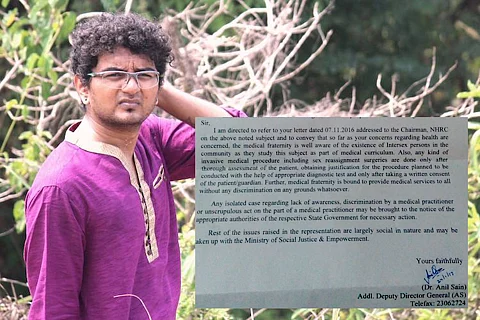

Activists who have been fighting for the rights of intersex persons have got another confirmation that the government is neither aware of their issues, nor is it willing to listen.
Gopi Shankar, an activist from Madurai and the first intersex person to contest an Assembly election, wrote to the National Human Rights Commission in November, demanding a ban on Sexual Reassignment Surgeries (SRS) on intersex infants. The NHRC had forwarded Gopi’s petition to the Ministry of Health and Family Welfare, directing it to reply within 8 weeks.
The government has sent their reply on time. But the reply itself is appalling.
‘Intersex’ is an umbrella term used in a variety of cases, where a person’s reproductive or sexual anatomy does not match the typical definition of ‘male’ or ‘female’. They could have ambiguous external genitalia or internal reproductive organs, chromosomal variations other than xx or xy, hormonal variations etc.
An intersex person is different from a transgender person; while intersex/sex characteristics are biological, transgender identity depends on a person’s experience of their gender. All human beings experience their gender differently, and you are cisgender if you identify with the gender you’re assigned at birth, and transgender, if you don’t.
And if you understand that sex and gender are not the same thing, you’d understand why it’s not right for doctors to surgically alter the genitals of an infant in order to fit social norms.
The Ministry of Health and Family Welfare, though, doesn’t believe there’s anything wrong with it. “The medical fraternity is well aware of the existence of Intersex persons in the community as they study this subject as part of medical curriculum,” says the reply by Dr Anil Sain, Assistant Deputy Director General in the Ministry.
“Any kind of invasive medical procedure including sex reassignment surgeries are done only after thorough assessment of the patient, obtaining justification for the procedure planned to be conducted with the help of appropriate diagnostic test and only after taking a written consent of the patient/guardian,” the letter adds.
But exactly how a newborn can give written consent to the doctors is something activists have been wondering about. “We’re not talking about surgeries performed on adults with their consent. We’re talking about surgeries performed on intersex infants, who cannot give consent.” asks Gopi Shankar.
Forced sex assignments of intersex infants can also cause long term health issues.
LGBTQIA activist and PhD student Leeny says, “How do you assign a gender unless the child grows up and tells what gender they identify with? Guardians cannot choose the sex of their babies.”
“They claim that the medical students study about intersex community in their coursework. But even today, doctors across the country don’t know the difference between a transgender person and an intersex person. The frequently confuse gender identity and biological sex,” Gopi said.
And while the government should be creating awareness about these issues, they themselves are ignorant. This is evident in the Rights of Transgender Persons Bill tabled in Parliament, where they have confused the definition of transgender person, and have left out intersex persons completely. In fact, by their definition, intersex persons are implicitly assumed to be trans.
For activists like Gopi, what’s important is that the Fundamental Rights of intersex persons be respected. “In a country where female infanticide is still prevalent, can you imagine what people would do to intersex infants? When there is no awareness about us, when we’re not even part of the Census, how can the government get away with such a lethargic response to such a serious issue?” Gopi asks.